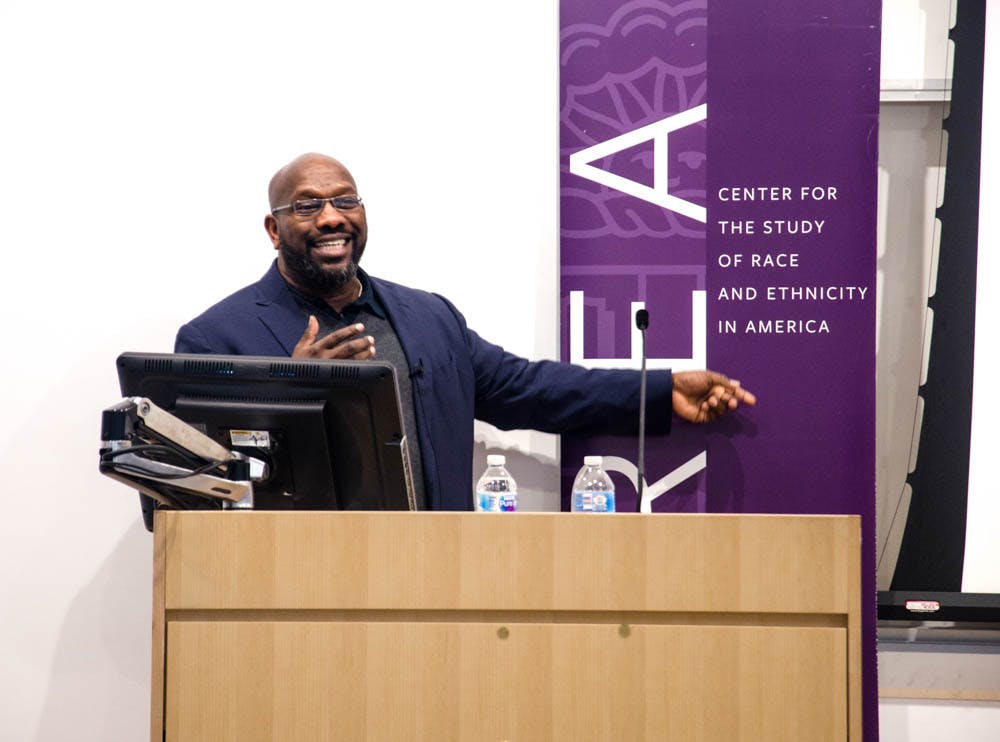“I have nothing to say about Cardi B,” remarked writer and hip-hop expert Bakari Kitwana, as he noted his own “lack of context” with contemporary rap at a lecture on the lasting influence of hip-hop in politics last week.
Kitwana, a journalist, activist and political analyst, was the first of four lecturers in the Hip Hop Lecture Series, which began on Feb. 12. The series, hosted by Professor of Africana Studies Tricia Rose, who is also the director of the Center for the Study of Race and Ethnicity in America, marks the 25th anniversary of the release of Rose’s foundational academic text “Black Noise,” which analyzes hip-hop through a scholarly lens.
Kitwana discussed the importance of “Black Noise” as a bridge between academia and hip-hop, saying, “The accomplishment and success of ‘Black Noise’ has to be understood in the context of how hip-hop was perceived in the academy at the time and for years after.” The book played an important role in promoting the scholarship of hip-hop, he said, adding that the text’s “interdisciplinary and intersectional” approach analyzes gender and race with depth, precision and passion.
Kitwana cited “Black Noise” as one of the inspirations for his own book, “The Hip-Hop Generation,” which he intended for a non-academic audience. “I wanted the book to be picked up by a high schooler, I wanted the book to be picked up by a person who maybe dropped out of high school, but still I wanted to elevate the intellectual conversation,” he said. His book aims to examine the politics behind hip-hop, asking: “How does the hip-hop generation depart from and emerge out of the aftermath of the Black Power Movement?” and “What possibilities exist for us to build a political movement in our lifetime?”
He also discussed the importance of his background in shaping his interest in politics and rap. Kitwana talked about the 1970s DJ battles he witnessed in his youth and the awe he felt watching Puerto Rican breakdancers perform at his older sister’s house in the Bronx. Politically, Kitwana’s interests were ignited by “the crack cocaine explosion and explosion of incarceration.” He discussed the perceived randomness with which punishments were dispensed within the criminal justice system. “It was a great preoccupation of mine because it affected people I personally knew, three of my cousins who did serious time. I always felt a compelling need to do something about it because it was not fair. They did not deserve it.”
In his early adult life, Kitwana worked as the editorial director at Third World Press and as a journalist at The Source magazine, where he encountered musicians such as the Wu Tang Clan. He credited The Source for helping him “frame early arguments” about the connection between politics and hip-hop. The magazine’s staff “imagined that hip hop had nothing to do with politics,” Kitwana said.
As a writer, Kitwana talked about his desire “to find ways to make the writing live beyond the page,” which prompted him to co-found the 2004 National Hip-Hop Political Convention that brought together 4,000 people in Newark to “address problems of the hip hop generation,” according to his website. The convention led him to become the executive director of Rap Sessions, which inspires community dialogues about hip-hop through a national tour of “town-hall style meetings,” according to his website.
Students in AFRI 0880: “Hip Hop Music and Cultures,” taught by Rose, attended the lecture and asked questions about the commercialization of hip-hop and youth culture.
Ivy Hobson ’22 reflected on how popular culture has emerged “as a site of struggle between marginalized groups and powerful groups over everyday life.”
An audience member’s question about generational culture sparked a debate that touched on how older generations involved with hip-hop interact with contemporary artists such as Cardi B. Kitwana argued that to comment on rap, one must be a part of the generation it is geared toward.
To this, Rose responded that “the whole point of history is to figure out things you didn’t experience,” and that it is a “vulcanized and potentially problematic assumption that being in a generation means you know something just automatically.” Laughter ensued when Rose remarked, “I don’t need to spend all day listening to patriarchal narratives to critique patriarchy.”
Kitwana agreed, reshaping his argument by adding that he meant if one is not “an active listener engaging in the new generation music,” then one cannot judge and critique. He added that when music was a part of his daily life, he listened to it with a different perspective than the one he has now as a father.





